Editor’s Note: This story was written by staff writers Anna Myroniuk, Oleksiy Sorokin, Illia Ponomarenko, Oleg Sukhov and Bermet Talant.
On March 4, President Volodymyr Zelensky reshuffled the government, replacing the prime minister and most of the members of the Cabinet. Most of the fired ministers worked in the government for just six months.
Here are the 10 ministers who were dismissed or decided to quit. For profiles of the new ministers, follow this link.

Finance Minister Oksana Markarova speaks during the 15th Kyiv Post CEO Breakfast on July 10, 2018 at the InterContinental Kyiv hotel. (Volodymyr Petrov)
Oksana Markarova
ex-finance minister
Replaced with Ihor Umansky
Oksana Markarova, 44, served as deputy finance minister for three years before becoming finance minister in 2018. She headed the investment group ITT from 2003 to 2014.
Markarova has been praised by anti-corruption activists and has been instrumental in Ukraine’s efforts to negotiate with the International Monetary Fund (IMF), the country’s biggest lender.
Ukraine’s relationship with the IMF has recently been threatened by the confrontation between the government and oligarch Ihor Kolomoisky, who is critical of the IMF and has been suing to get back his former bank, PrivatBank, which was nationalized in 2016 after auditors found more than $5.5 billion missing. The IMF has been demanding that Ukraine adopt a bill banning the return of banks to previous owners after nationalization.
Although praised for her work, Markarova has not been without controversy. Her ITT firm partnered with companies controlled by Andriy Klyuyev and his brother Serhiy – allies of ex-President Viktor Yanukovych who stand accused of corruption – according to a 2015 investigation by Slidstvo.Info. ITT was under investigation by the Prosecutor General’s Office, but no charges were filed.
According to a 2019 report by Schemes, an investigative project of Radio Free Europe/Radio Liberty, a historic building was transferred to Markarova’s firm at a below-market price from her Aktiv-Bank before the bank went bankrupt. Markarova denied accusations of wrongdoing.
Daria Kaleniuk, executive director of the Anti-Corruption Action Center, believes that “the dismissal of Markarova, who is a professional and has the IMF’s trust, is a threat.”
Political analyst Volodymyr Fesenko attributed the dismissal to Zelensky’s dissatisfaction with her ministry’s performance, including a shortfall in budget revenues and problems arising from the hryvnia’s rapidly increasing exchange rate.
“It was Markarova’s fatal mistake that she calmed down and thought she was irreplaceable,” Fesenko said.
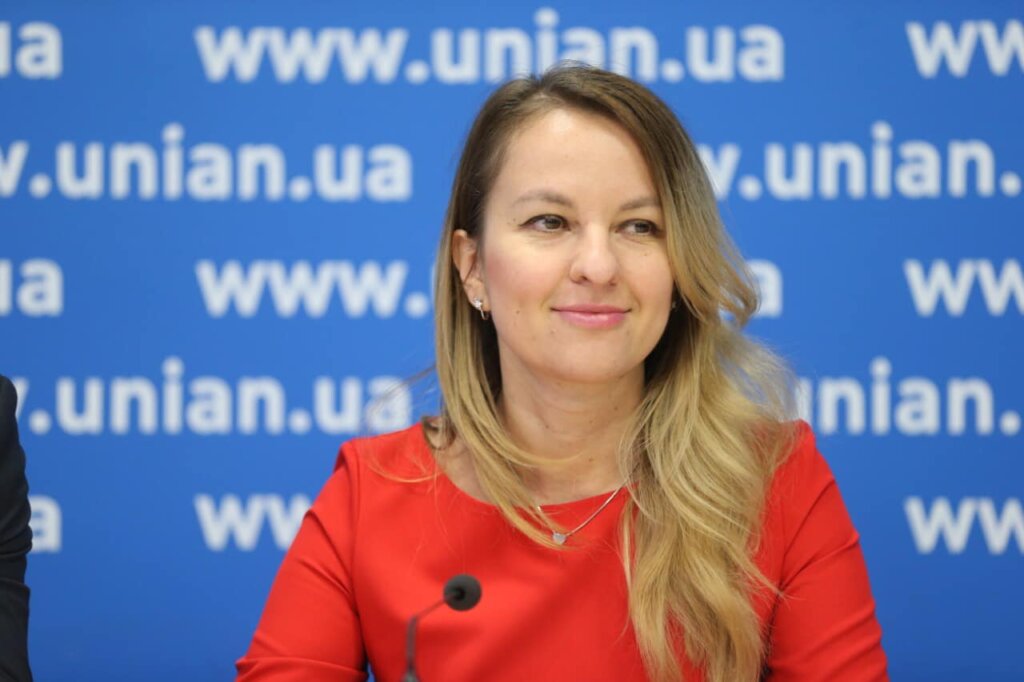
Yuliya Sokolovska
ex-minister of social policy
Replaced with Maryna Lazebna
Yuliya Sokolovska, 34, served as minister of social policy since Aug. 29.
Sokolovska is a graduate of Kyiv National Economic University. After the EuroMaidan Revolution that ended Yanukovych’s presidency in 2014, she started at the Ministry of Economic Development and Trade as a director of the workflow department. A year later she left the job to chair the department of social spending.
In 2017, Sokolovska worked with the U.S. Agency for International Development on medical reform. She was responsible for the optimization of Ukrainian hospitals and introduction of the e-Health system.
Sokolovska also worked as an adviser to Markarova, minister of finance from June 2018 until the Cabinet of Ministers’ dismissal on March 4.
As the social policy minister, Sokolovska launched a hotline for combating human trafficking and domestic violence in February. Sokolovska’s ministry also put together and submitted a new labor code to parliament.
However, Sokolovska was criticized for her policies regarding pensions, such as delaying the annual pension indexation expected to begin in the spring. Sokolovska proposed increasing monthly payments by $9 in 2020 and approximately $48 by 2023. Many argued that given inflation rates, the increases would be negligible.
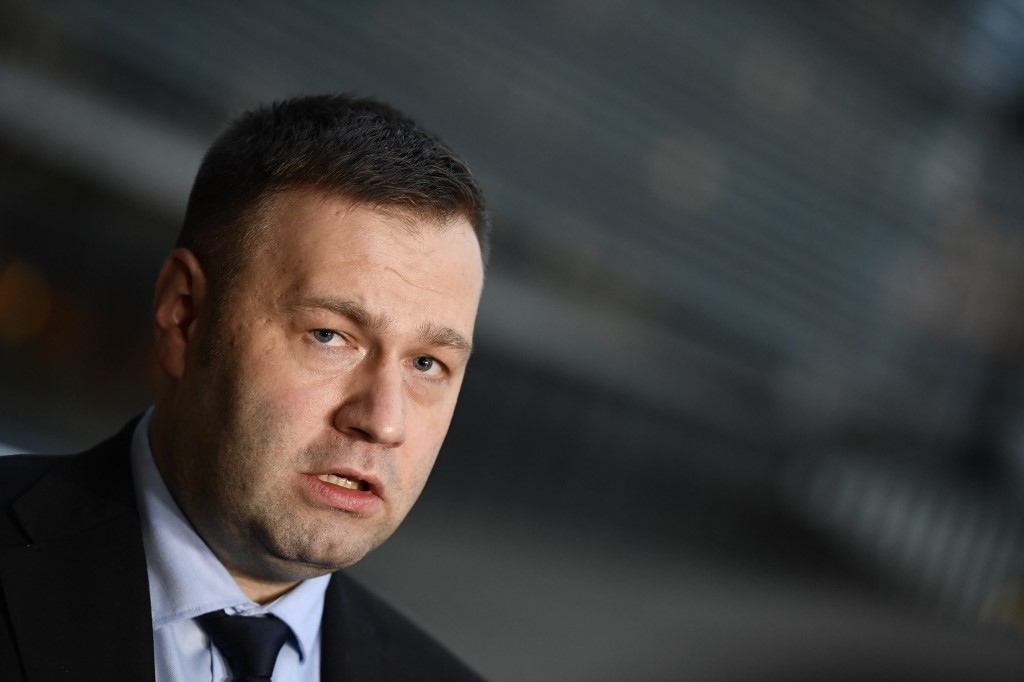
Ukraine’s Minister of Energy and Environmental Protection Oleksiy Orzhel gives a joint press conference after “Trilateral Gas Talks” between the EU, Russia and Ukraine at the EU Commission headquarters in Brussels, Belgium on Oct. 28, 2019. (AFP)
Oleksiy Orzhel
ex-minister of energy and the environment
Oleksiy Orzhel, 36, is an energy manager with over 15 years of experience, in the public and private sectors. He served as energy minister for six months. During Orzhel’s term, Ukraine’s state-owned Naftogaz signed a new contract with Gazprom on gas transit from Russia to Europe through Ukraine. The five-year contract was signed in December.
Russia originally pushed for a one-year extension to the transit agreement due to the upcoming completion of Nord Stream 2, but agreed to a five-year deal in return for Ukraine’s withdrawal of pending legal claims against Russia’s Gazprom.
The government has not yet decided on a candidate to replace Orzhel. When the new Cabinet was voted in on March 4, the energy minister’s position remained vacant.

Tymofiy Mylovanov, the minister of economic development, trade and agriculture, delivers the keynote speech on the country’s innovative future on Dec. 10, 2019 during the Kyiv Post’s Tiger Conference at Unit City Innovation Park in Kyiv. (Oleg Petrasiuk)
Tymofiy Mylovanov
ex-minister of economic development, trade and agriculture of Ukraine
Tymofiy Mylovanov, 44, is a graduate of Kyiv Polytechnic Institute and Kyiv-Mohyla Academy. He earned a Ph.D. in Economics from the University of Wisconsin-Madison in 2004 and for years worked as a lecturer at a number of Western universities.
During the 2014 EuroMaidan Revolution, Mylovanov co-founded VoxUkraine, an independent analytical platform focused on economic and political analysis. In 2016, Mylovanov became president of the Kyiv School of Economics. That same year he was appointed deputy chairman of the council at the National Bank of Ukraine, where he worked until his ministerial appointment in August 2019.
As minister, Mylovanov launched a massive privatization process that would put some 960 state enterprises up for privatization. He was also involved in preparing the bill that would lift the ban on farmland sales. The bill has been facing obstruction in parliament, with lawmakers taking weeks to consider it.
After his dismissal on March 4, rumors broke that Mylovanov would keep a seat in the Cabinet. Mylovanov confirmed that he was invited to head the newly-created Ministry of Agriculture, but said that he rejected the offer because “the government’s vision changed” and didn’t match his own anymore.
The agriculture and economy ministries remain without ministers.
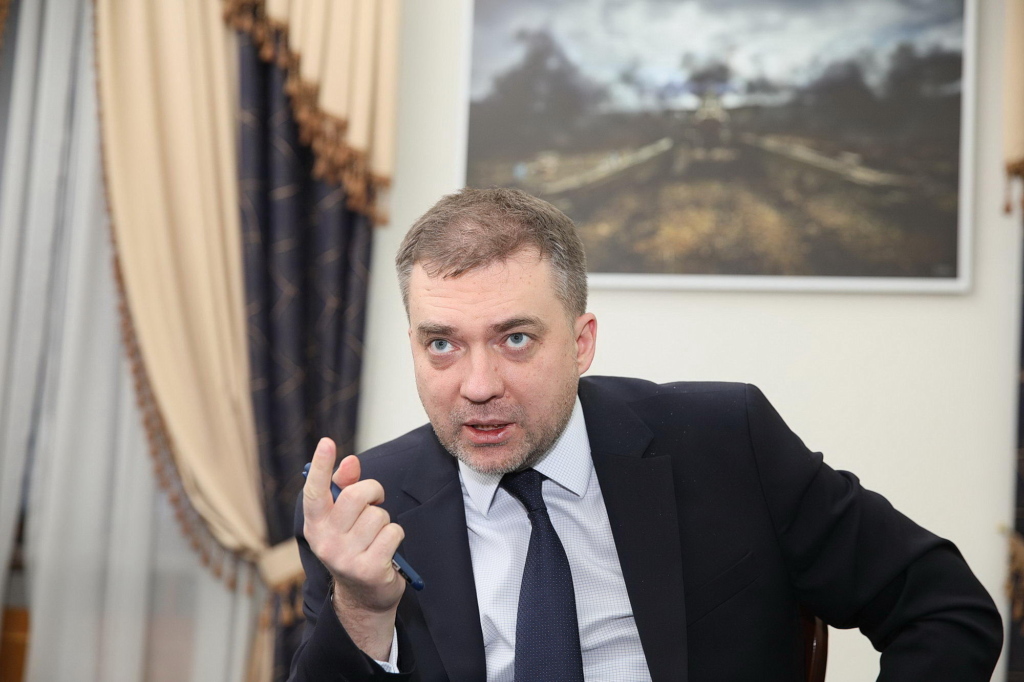
Ukraine’s Defense Minister Andriy Zagorodnyuk talks to the Kyiv Post on Jan. 30, 2020. (Volodymyr Petrov)
Andriy Zagorodnyuk
Ex-defense minister
Replaced with Andriy Taran
On the day of his appointment, Andriy Zagorodnyuk, 42, became the youngest defense minister in Ukraine’s history and the first top defense official appointed from civilian life.
In the course of his six months in the ministry, Zagorodnyuk took steps to develop a new defense policy centered on a systematic, strategy-oriented vision of military procurement.
During his term, the government also approved a three-year military production plan praised by many experts and initiated a long-anticipated declassification of defense procurement designed to eliminate corruption.
His team concentrated on numerous issues that had been overlooked for years, including new military infrastructure, such as new housing and training facilities for service members, and took steps towards making military service more attractive and career-oriented.
In his interview with the Kyiv Post in late January, Zagorodnyuk vowed to present tangible results from his first six months as soon as possible. But, by then, numerous media reports said Zelensky was unhappy with the progress of military reforms and asserted that the defense minister “did not show his worth.”

Oksana Koliada, minister for veterans’ affairs, poses for a selfie with Ukrainian servicemen
Oksana Koliada
Ex-minister for veteran affairs, the occupied territories and internally displaced persons
Replaced with Serhiy Bessarab
A lawyer and former defense ministry media service chief, Oksana Koliada, 39, (known under the last name Havryliuk before 2019) continued constructing a foundational framework for the recently-created Ministry for Veteran Affairs.
Her main goal was to provide an effective support system for the more than 1 million Ukrainian combatants of various conflicts, including over 350,000 veterans of Donbas, many of whom are young people struggling to find a place in civilian life.
Under her oversight, Koliada’s ministry was unified with the ministries for the occupied territories and internally displaced persons, a bold move that came as an unpleasant surprise for many.
In a farewell post on her Facebook page, Koliada noted that she hoped she had “launched the mechanisms of state veteran policies that will be too hard to cripple.”
Under Koliada, the ministry successfully lobbied for a bill to grant official veteran status to volunteer fighters, both Ukrainians and foreigners. The ministry also designed a bill to modernize the legal status and benefits for veterans and test-launched E-Veteran, an online system compiling educational, employment, financial and recreational services for veterans.
Koliada also said she was proud of what had been done during her tenure and that she had never planned to remain as the head of the Ministry for Veterans Affairs for too long.
The reason behind the dismissal of Koliada, who is rather popular in the military community, remains a mystery. Officials have not provided an explanation. Just two days before the resignation, she asserted that no one had discussed her dismissal with her.
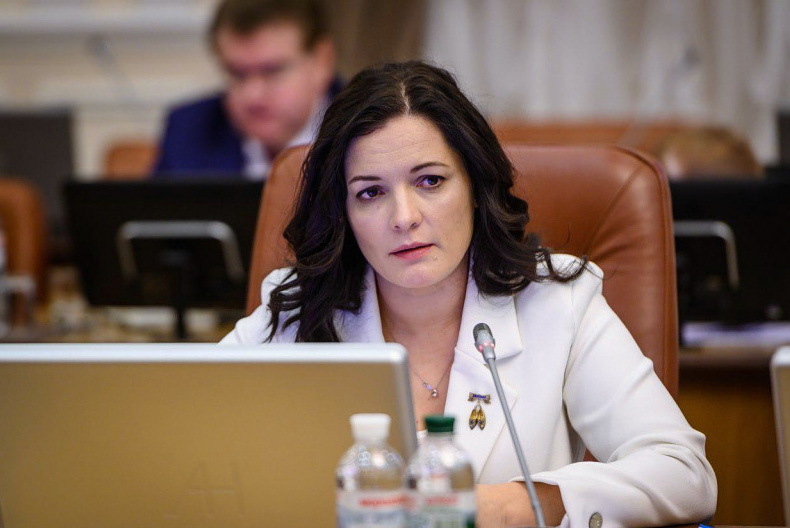
The photo shows Ukrainian Health Minister Zoriana Skaletska during a Cabinet of Ministers meeting on Feb. 12, 2020. (kmu.gov.ua)
Zoriana Skaletska
Ex-health minister
Replaced with Ilya Yemets
Zoriana Skaletska, 39, a medical lawyer, managed to get herself involved in a few big scandals during her tenure of just six months. Soon after Skaletska took office, a group of officials quit, criticizing the new chief’s effectiveness.
In December 2019, Iryna Lytovchenko, who at the time chaired the ministry’s department on European integration, left the office along with her team. She accused Skaletska of forcing the ministry’s staff to remove all the references about her predecessor, Ulana Suprun, from internal documents – a waste of time, Lytovchenko said. A number of other deputies and advisors left soon after.
Experts heavily criticized Skaletska for failing to purchase HIV medicine on time with money already allocated in the state budget. International organizations had to chip in so as not to disrupt patients’ treatment.
Oleksandra Ustinova, a lawmaker and a former anti-corruption activist, believes Skaletska’s biggest failure was the poor implementation of medical reform that was started by her predecessor.
“Hospital staff in the regions have no idea what is happening and what they are supposed to do,” Ustinova told the Kyiv Post. “Instead of traveling around the country checking to what extent every hospital is prepared for the reform, the minister is playing tennis in Novi Sanzhary.”
When she was replaced, Skaletska was in a sanatorium in Novi Sanzhary, a town some 400 kilometers east from Kyiv, along with dozens of Ukrainians and foreigners evacuated from Wuhan, China amid the deadly coronavirus outbreak.
Skaletska voluntarily placed herself in quarantine for two weeks to calm the outraged locals, who protested the arrival of the evacuees.
Olga Stefanyshyna, a former health ministry staff member and now a lawmaker, blamed Skaletska for the local outrage. Stefanyshyna believes Skaletska’s ministry failed to explain the situation to Ukrainians and to undertake necessary preparations.
“In my opinion, Ukraine has not had a minister for almost 14 days now because Skaletska left for Novi Sanzhary. She went there during the hottest phase of the preparations before the second round of medical reform’s launch,” Stefanyshyna said.
“A bunch of documents for the reform that had to be approved back in November were eventually passed in December-January. The reform has to launch on April 1, but the Ministry slowed down this process,” she said.
In parliament on March 4, Zelensky thanked Skaletska for her bravery but pointed out that “there are questions” regarding the failures of the reform process.
In general, experts support Skaletska’s dismissal and say that her departure will not disrupt medical reform.

Education Minister Anna Novosad (L) receives Kyiv Post’s Top 30 Under 30 award during a ceremony on Dec. 10, 2019 in Kyiv. (Oleg Petrasiuk)
Anna Novosad
Ex-education minister
Anna Novosad, 29, was invited to join the Servant of the People party on the recommendation of former Prime Minister Oleksiy Honcharuk. After the parliamentary elections, he offered her a position in his Cabinet.
After Honcharuk was dismissed, she was reportedly offered a position in the new government, but decided to resign.
Appointed at the age of 29, Novosad was one of the youngest ministers in Ukraine’s history. In her work, she committed to continue reforms started by her former boss and predecessor, Liliya Hrynevych. During her term, parliament adopted a law on secondary education that envisions giving high school students more control over their individual curriculums and allowing them to choose subjects that interest them, among other changes.
Read more about Anna Novosad here
A month before she left, Novosad sparked public debate after she said that her ministerial salary of Hr 36,000 (over $1,400) wouldn’t be enough to raise a child if she wanted to start a family. Some criticized her, saying that most Ukrainians survive on much smaller incomes.
She is yet to be replaced.
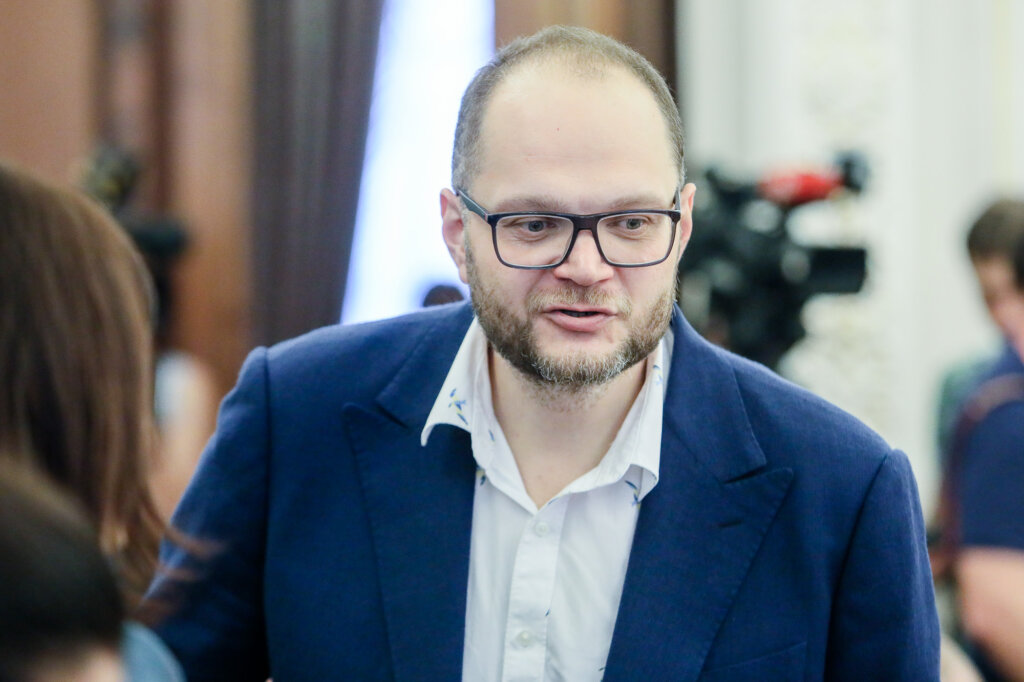
Minister of Culture Volodymyr Borodyansky at the meeting of the president of Ukraine with the leadership of the Ukrainian parliament, the Verkhovna Rada; the Cabinet of Ministers and law enforcement authorities on Sept. 2, 2019. (Volodymyr Petrov)
Volodymyr Borodyansky
Minister of culture, youth and sports
Volodymyr Borodyansky, 46, is a Ukrainian producer. Before taking on the Ministry of Culture, he led StarLightMedia Group, Ukraine’s largest media group owned by billionaire oligarch Victor Pinchuk. Its market share is over 25%.
As minister, Borodyansky was connected to several scandals, including a controversy surrounding the so-called draft law on disinformation that was heavily criticized by media experts.
This draft law proposes dividing journalists into categories, creating a state-controlled association of professional journalists and introducing an information commissioner with the power to block and fine journalists and media outlets.
The law would also create criminal penalties for disinformation, a norm that many fear could be used to silence the independent press.
Despite heavy criticism, Borodyansky defended the bill.
Under Borodyansky, UATV, the state-owned multi-language broadcaster, was canceled and replaced with a Russian-language channel that targets Russian-speaking Ukrainians, primarily those in the Donbas.
Ukrainian media reported that Borodyansky was offered to keep his seat in the new government but declined.
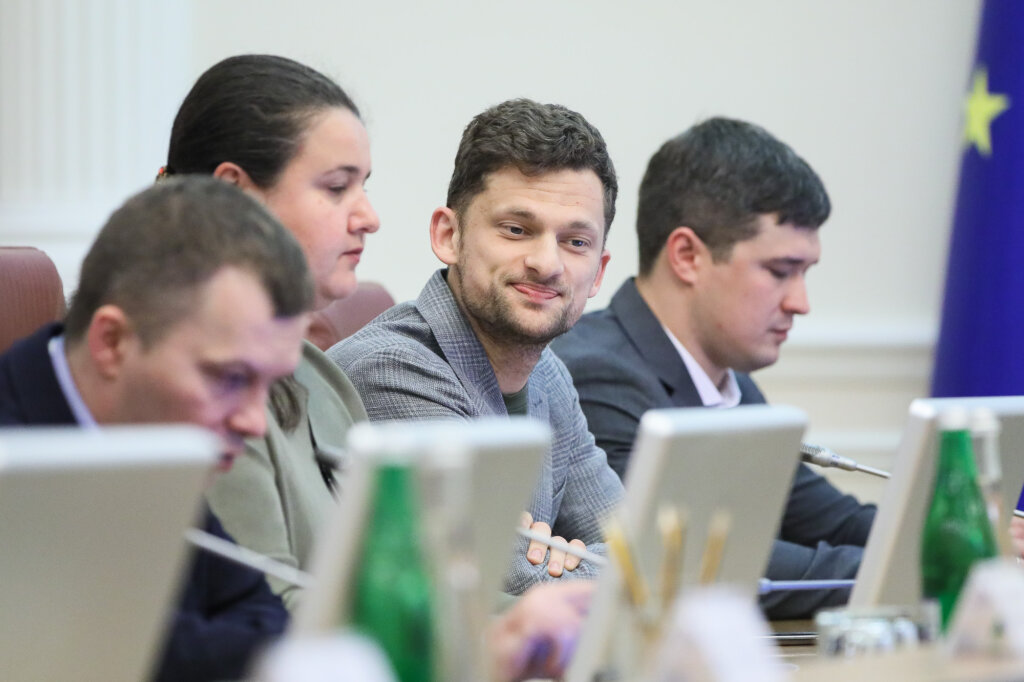
The Minister of the Cabinet of Ministers Dmytro Dubilet at the first meeting of the new Cabinet of Ministers of Ukraine on Sept. 2, 2019. (Volodymyr Petrov)
Dmytro Dubilet
minister of the Cabinet of Ministers
Replaced by: Oleg Nemchynov
When Dmytro Dubilet, 34, a banking tech entrepreneur, took an administrative role in the Cabinet of Ministers, he declared his goal was to increase its efficiency. He wanted to reduce bureaucracy and digitize all paperwork.
Updates on his popular Telegram channel painted a picture of a broad range of initiatives he undertook. For instance, he fought illegal seizure of businesses, concluded that 70% of reports produced by state bodies were useless, carried out an electronic census of Ukraine’s population and shut down a hairdresser’s salon inside the Cabinet of Ministers building to turn it into an office for the investment team.
Dubilet will stay with the government in a different role, according to Prime Minister Denys Shmygal. He did not specify which role that will be.
